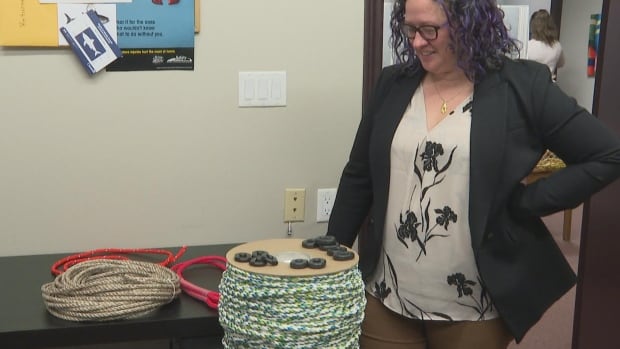Some members of the P.E.I. fishing community are welcoming DFO’s decision to extend the deadline for break-free fishing gear until 2024.
This is when fishers will be required to use gear designed to break under 1,700 pounds to help species like the endangered North Atlantic right whale escape during an entanglement.
“I mean, we’re certainly happy to see it extended,” said Marvin Jollymore, a lobster and eel fisher from New London, P.E.I.
“There’s so many questions as to, you know, how long does [the gear] last? You put it in, does it last one season? Does it last two seasons, does it last forever? Is it only good for half a season?”
The new requirements of the Department of Fisheries and Oceans were originally supposed to be in place by 2022. But that was delayed by a year because of COVID-19.
Last month the department announced that the deadline would be extended again for fisheries in Atlantic Canada and Quebec.
“We’ve learned a lot and we’ve changed a lot of our fisheries management to protect right whales over the past several years and frankly what we’ve learned is that we need to be careful about this kind of technology,” said Brett Gilchrist, DFO’s director of national programs.
“Every fishery in Canada is different.”
‘We need to have time’
The P.E.I. Fishermen’s Association welcomes the extension. The association said it will allow for more trials and give fishers time to prepare.
“The right decision by DFO ultimately because to have a successful transition we need to have time to trial,” said Melanie Giffin, a marine biologist with the PEIFA.
“Fishers need to be given the time to put in different options, see what works for them. Because what works for a fisher in one area in P.E.I. may not work for a fisher in another area.”

Jollymore agrees.
“We’re always apprehensive in partaking in anything new until it’s explored or figured out if it will or will not work,” he said.
“You’ve got to be concerned about it jumping out of your hauler when you’re hauling your gear and lot of stress on the rope. Is that something that’s going to jump out and hit you in the hand, break your hand or hit you in the face?”
‘Healthy balance’
According to Giffin, there is no record of a North Atlantic right whale ever getting entangled in P.E.I. lobster gear. The group initially asked DFO for an exemption for lobster fishers but was denied.
“We want a healthy balance between fishing and making sure we’re protecting those whales,” she said.
“It’s a very valid question as to whether or not it did need to be changed. At this point, we’re still on the fence, considering that there were never any sightings or entanglements here.”

There are fewer than 350 North Atlantic right whales in existence and their distribution patterns are changing.
“We still don’t know exactly why they’ve relocated and we don’t know if they’re going to stay. What that also means is we don’t know where they’re going,” said Gilchrist.
Looking for feedback
Gilchrist pointed to closure protocols that require fishers to pull their gear from the water if a right whale is spotted. But with the new gear requirements, some wonder if those closures will still be necessary.
“Either you move or the whale moves. Well, if it’s the whale, I mean, you just can’t go out and shove a whale out,” said Jollymore.
“When we all put this whale-safe gear in, then we should never have to be threatened with the thought that we’ll ever have to take out gear.”
DFO said although the current timeline is now set for 2024, it will use the feedback it receives this season to determine the best way forward.
“If it’s not a best fit because harvesters don’t like it because it’s a challenge but it actually works to protect right whales … there may still be an interest in implementing this rule,” said Gilchrist.
“If there are clear safety issues associated with lower breaking strength gear, then it’s something we absolutely have to take into consideration.”
The PEIFA said some fishers have also been thinking outside the box to come up with alternative solutions that work for them while also protecting the whales.


